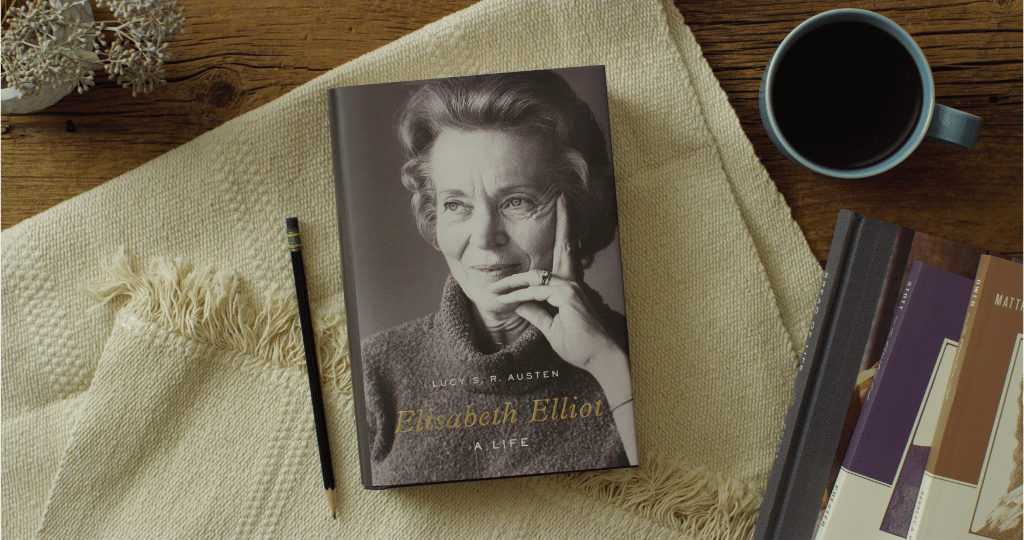Reading biographies of fellow Christians can greatly shape our lives and encourage our faith. Biographies remind us we are part of a larger story, and that we do not have to reinvent the wheel when it comes to faithfulness. Biographies reveal that Jesus alone will never let us down. And lastly, biographies reinforce the value of passing on a good testimony. A wonderful case study of this is the biography of missionary Elisabeth Elliot, whose life exemplifies each of these and more.
Table of Contents
7 minutes
The Early Years: School and Calling
Elisabeth “Betty” Howard was born in Belgium in 1926, where her parents Katharine and Philip served with the Belgian Gospel Mission. When she was a few months old, they returned to the United States, where her father took over the job of associate editor of The Sunday School Times, a religious weekly publication. The discipline and structure with which Elisabeth was raised influenced much of her own personal discipline and general reticence. Taught the Bible and active in family devotions from a young age, Elisabeth made a public profession of faith at the age of ten during a meeting at Moody Bible Institute.
Elisabeth’s faith and devotion continued to grow from her childhood, and is evidenced in the journals she filled throughout her life. In high school, she was introduced to the life and ministry of Amy Carmichael, a missionary and single woman serving in India, whose writings would influence Elisabeth for years to come.
After graduating high school, she attended Wheaton College, eventually majoring in Ancient Greek due to her aptitude for languages and interest in Bible translation. Her classes threw her into the path of Jim Elliot, an eager Greek student who was a year behind her in school and a close friend of her younger brother, Dave. They would gradually fall in love, but even then their shared calling to the mission field would draw their attention than talk of love and marriage.
After college graduation, Elisabeth weighed a variety of options about her future. Neither she nor Jim felt the freedom from the Lord to marry, as both felt led to the life of a single missionary. After graduation in 1948, Elisabeth spent time in various places studying and serving. A permanent move to a full-time missionary post was always on her mind, and in particular, a short-term assignment with a Spanish assembly in New York City began to draw her heart to the Latin American mission. Though separated by many miles, the Lord knit Jim and Elisabeth’s hearts and lives together through writing letters and seeking the Lord separately in prayer.
On the Field: Marriage and Tragedy
Commissioned as a Christian Brethren missionary, Elisabeth moved to Ecuador in 1952 to work with three other single women there. Jim also served in Ecuador at the same time, but on the other side of the mountains from Elisabeth. Elisabeth’s primary role in her first post was to learn the unwritten language of the native Colorado tribe in western Ecuador. The trials of her translation work strengthened Elliot’s faith and trust in God. After years of long-distance correspondence, Jim and Elisabeth married in Quito, Ecuador, in October 1953. The couple was eager to reach the Quichua people and other remote tribes for Jesus, and their daughter Valerie was born in 1955.
Later in 1955, Jim Elliot and four fellow missionaries—Pete Fleming, Nate Saint, Ed McCully, and Roger Youderian—began contacting the Waorani (“Auca”) tribe, a brutal people group considered unreachable and dangerous to outsiders. The five men attempted to reach this tribe by dropping gifts and messages from an airplane as they flew by. After seemingly successful contact with three Waorani tribe members, a group of Waorani viciously speared all five men to death in January 1956. Elisabeth and Jim had only been married twenty-seven months, and Valerie was just ten months old when he died.
Rather than return home to the United States, Elisabeth stayed in Ecuador, continuing work with the Quichua, and eventually relocating to live among the Waorani people who had killed her husband. After residing there for a year, Elisabeth and Valerie returned to Shandia for the remainder of their time in Ecuador. Elisabeth did not cut off all ties with the Waorani people, though, visiting the Waorani village a few times even after moving back to the United States. In 1957, she wrote Through Gates of Splendor, the story of the martyred missionaries, which became a publishing success for mainstream publisher Harper Collins. The world of publishing and writing differed greatly from missionary life in Ecuador, but Elisabeth’s skill at writing flourished over the next several decades. Eventually she felt the Lord leading her back home permanently, returning to the United States in 1963, ten years after her arrival in Ecuador.
Return to America: Writing and Speaking Ministry
At home, Elisabeth settled into life as a writer and speaker, assuming a pattern of normalcy. Surprisingly, she fell in love again, marrying Addison Leitch, a professor of theology at Gordon-Conwell College in 1969. Tragedy struck three years into their marriage, when Leitch was diagnosed with cancer, dying six months later in September 1973. Suffering was no stranger to Elliot, yet she refused to wallow in tears or blame God. Her testimony throughout her first husband’s murder and her second husband’s cancer diagnosis and painful death remained the same: suffering is never for nothing.
Elisabeth later married Lars Gren, one of the Gordon-Conwell Seminary boarders she took in after Addison died. He was, in Elisabeth’s terms, the manager of her speaking schedule, book sales, and even of Elisabeth herself. Elisabeth and Lars’ marriage lasted from 1977 until Elisabeth’s death in 2015.
In the 1980s, she became writer-in-residence at Gordon College in Massachusetts, while also speaking frequently at conferences and events. She published a bimonthly newsletter from 1982-2003, and a fifteen-minute daily radio program that aired on Back to the Bible Network from 1988-2001. Elisabeth’s books such as Let Me Be a Woman, Passion and Purity, and Discipline were standards for Christian life and living in the 1960s-1980s, read by scores of Christians and influencing the spiritual lives of many. She wrote over twenty books in the span of multiple decades. In her later years, Elisabeth lived with dementia, retiring from public life in 2004 before passing away on June 15, 2015.
Elisabeth Elliot’s Life and Example continues to speak to us today
Elisabeth’s life as a missionary, wife, writer, and speaker was one lived in obedience to the call of her Savior alone, and many who read her books and knew her ministry have been changed because of her passionate commitment to God. As we consider the sum of her biography, here are four things Elisabeth Elliot’s life and example continue to speak to us today.
Elisabeth’s story reminds us we are part of a larger story.
Elisabeth’s parents, the Howard family, modeled this as missionaries and as a mission-minded family. Missions saturation (through frequent missionary visits and correspondence) in early life almost certainly formed her passionate missionary focus later. She was shaped by those who came before her, and through her writing and teaching, she has guided and shaped those who come behind her. Her life reminds us that as believers, we are part of a bigger story, and are called to live a life fully surrendered to the gospel call, that larger story of our individual lives.
Elisabeth’s biography reminds us that we don’t have to reinvent the wheel when it comes to faithfulness.
The priority of Scripture was a guiding force in her life. Like a ruler, she called the Bible her “straight edge,” saying “without a straight edge you cannot see how crooked you are.” Stories of missionaries and people of faith inspired her in the same way that her life inspires others now. Elisabeth lived a life faithful to God’s word, as generations of Christians have for centuries. We can trust the Bible as our guide for life and godliness, living a faithful life without having to be cutting edge or super cool.
Elisabeth’s life reminds us that Jesus alone will never let us down.
He alone is perfect and true, and He alone can use broken human vessels for his purpose. Elisabeth struggled with doubt and insecurity, with natural reticence that caused rifts with people close to her. Recent biographies reveal flaws in her life to all her readers. Rather than looking to her as a paragon of holiness and virtue, Elisabeth would remind us that only Jesus is truly good and perfect. We are saddened to learn about her flaws in part because those flaws are also in our lives as well. May these flaws bring us to Jesus, who is perfect, true and faithful. Elisabeth clung to that truth, and so must we.
Elisabeth’s story reminds us of the value of passing on a good testimony.
The shocking story of the five missionaries slaughtered in Ecuador made the front cover of Life magazine, and set Elisabeth on the path of writing and speaking that would influence an entire generation. Elisabeth lived a life of faithfulness on two different continents with three different husbands. Though we can talk about the number of books she wrote and lives she impacted in large speaking events, her biggest impact came from people with whom she corresponded, visited her home, or attended her bible study. As believers, we are to pass on our testimony to others by what we say and what we do. We must remember that every moment is a chance to rely on Christ. Living as redeemed creatures in right relationship with God will outflow into a faithful testimony to those around us.
As believers in the 21st century, we have a multitude of faithful believers in the past who can inspire our lives today. Elisabeth Elliot is one of many who can inspire our faith and grow our love for God as we learn about her life.

Leah Finn is married to Nathan and the mother of four children. She holds a Master of Arts in Christian Studies from Southeastern Baptist Theological Seminary, where her focus was on the life and legacy of Elisabeth Elliot. She homeschools her children, volunteers with college students and believes that history and biography are key tools for training the next generation to follow Jesus faithfully. Follow her at @leahpfinn.
